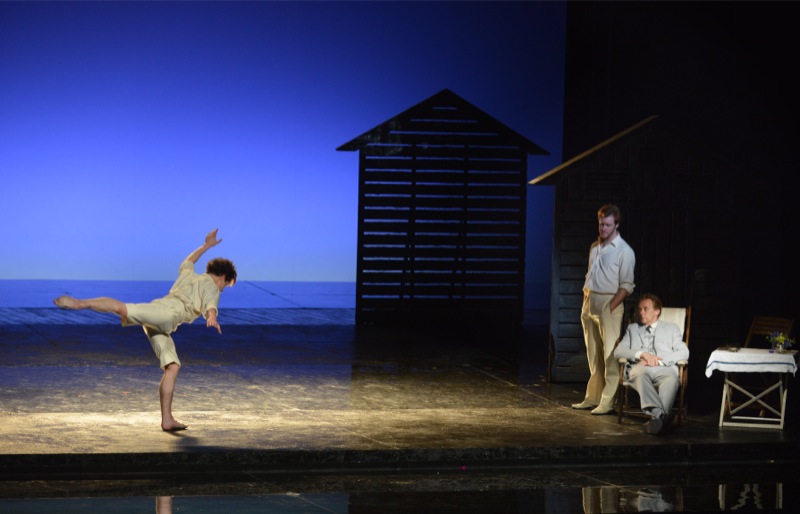Death in Venice, English National Opera, London Coliseum, June 2013 (original) (raw)
Posted on 15 June 2013
Gustav von Aschenbach, the protagonist in Thomas Mann’s 1912 novella is enraptured by a Polish boy Tadzio, just as Mann himself was during his 1911 stay at the Grand Hôtel des Bains on the Venice Lido. Britten’s opera fully brings to life Aschenbach’s suppressed passion, and the haunting Venetian soundscapes, complemented by Deborah Warner’s remarkable production with its languidly intense lighting by Jean Kalman, bring to life the sun-drenched heat of Venice.
All images ENO/ Hugo Glendinning
As Aschenbach himself, John Graham-Hall gave a sensational performance of the Munich writer whose mind beats on and no words come. Going to Venice is a release, yet trapped by his love for Tadzio and knowing of the plague about to engulf the city he cannot find the words to tell the boy’s mother. Madam, I will say …, but then she suddenly appears, looking for something she mislaid, and he remains silent, not wishing to lose the boy who inspires him. What is self-possession … compared to the rewards of chaos? Indeed, Mann saw sickness as a power for creativity counterbalancing tradition and conformity, but in the end we see Tadzio silhouetted against the sun, with Aschenbach slumped in a deckchair, and the light slowly fades.
Tadzio and Aschenbach
Silhouettes played a subtle and ever-present role in this production, helping emphasise the dichotomy between light and darkness, clarity and mystery. Gondoliers appeared silhouetted against the background, a reminder of location, but also of the strange old gondolier who deposits Aschenbach at the Lido without waiting for payment. His role was sung by Andrew Shore who cleverly inhabited most of the other baritone roles, as was done when this opera first appeared in 1973.
At that time, Ashton prepared the choreography but here it was Kim Brandstrup, who gave a fine account of the physicality of Tadzio and the other boys. Sam Zaldivar beautifully portrayed Tadzio, and Marcio Teixeira gave a robust performance of his friend Jaschiu, while Laura Caldow as his elegant mother glided gracefully across stage with her children in tow. The other boys were all excellent, and this aspect of the opera complemented the obvious summer heat that John Graham-Hall’s Aschenbach expressed so well.
Graham-Hall’s diction was superb, which was important because of the decision to abandon surtitles. That did not seem to matter much, though I found myself occasionally looking for them as when the otherwise excellent Andrew Shore sang falsetto, or again sometimes with the fine chorus, and with Tim Mead’s well-sung counter-tenor role for the Voice of Apollo.
Tadzio, Aschenbach and the Voice of Apollo
This production by Deborah Warner with its clarity and mist, its atmospheric lighting, and out of focus silhouettes in the background, helps convey the intensity of feeling at the heart of this work, and Edward Gardner’s fine conducting of Britten’s music does the rest. An excellent revival by the ENO, worth every minute of the evening.
Performances continue until June 26 — for details click here.
Categories
Tags


